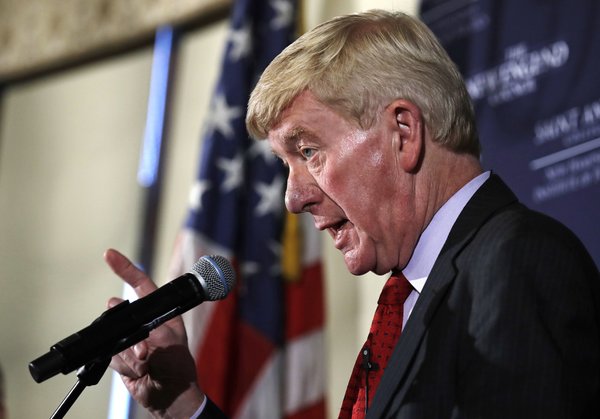
Former Massachusetts Gov. William Weld gestures during a New England Council 'Politics & Eggs' breakfast in Bedford, NH, Friday, Feb. 15, 2019. (Photo: AP)
William Weld, a former Massachusetts governor who ran for vice president on the Libertarian Party ticket in 2016, became the first Republican to take a serious step toward challenging President Donald Trump in 2020.
Speaking Friday at a breakfast in New Hampshire, Weld said he has created a presidential exploratory committee. He blasted Trump for leaving the nation in “grave peril.”
“We have a president whose priorities are skewed towards promotion of himself rather than for the good of the country,” Weld said. “He may have great energy and considerable raw talent but he does not use that in ways that promote democracy, truth, justice and equal opportunity for all. To compound matters, our president is simply too unstable to carry out the duties of the highest executive office in the land.”
The move makes Trump the first incumbent president since George H.W. Bush in 1992 to face a notable primary challenge. Other Republicans eyeing a presidential campaign include former Ohio Gov. John Kasich and Maryland Gov. Larry Hogan.
Trump remains very popular with Republicans so faces little risk in losing the GOP nomination. But primary challenges often foreshadow trouble ahead for incumbent presidents. Bush and Jimmy Carter lost their bids for a second term after facing challenges from inside their own party.
Asked to comment on Weld’s campaign, White House press secretary Sarah Sanders responded: “Who?”
Stephen Stepanek, the chairman of the New Hampshire Republican Party, pointed to Weld’s past support of President Barack Obama and said he didn’t “expect his campaign to get very far among Republican primary voters.
“The Republican Party is a big tent, but someone who endorsed Barack Obama in 2008 and 2012 and supported Hillary Clinton in 2016 as the Libertarian Party’s vice presidential nominee really needs to think about how welcome he is in the Republican Party,” Stepanek said in a statement.
Fiscally conservative but socially liberal, the 73-year-old Weld ran on the Libertarian party ticket in 2016 with former New Mexico Gov. Gary Johnson, receiving about 4.5 million votes, or a little more than 3 percent of the national popular vote.
Despite a pledge to libertarians that he would remain loyal to the party going forward, Weld on Jan. 17 walked into the clerk’s office of the Massachusetts town where he lives and re-registered with the GOP, adding to speculation that he would challenge Trump in the primaries.
Weld has not won a political race since being re-elected governor by a landslide in his heavily Democratic state in 1994. He was first elected to the office in 1990, defeating a conservative Democratic candidate, and quickly became one of Massachusetts’ most popular governors in recent history.
While holding the line on spending and taxes, Weld as governor embraced liberal positions at odds with national Republicans on abortion and gay rights. His low-key style and sharp wit also seemed to play well with voters as did his penchant for the unexpected: He once ended a news conference touting progress in cleaning up Boston’s polluted Charles River by diving fully clothed into the waterway.
After winning a second term, Weld’s attention appeared to drift away the governor’s office and toward other political pursuits. He briefly entertained a run for president in 1996 before mounting an unsuccessful campaign that year to unseat Democratic Sen. John Kerry.
He resigned as governor the following year after then-President Bill Clinton nominated him to be ambassador to Mexico, but it was a post he would never hold. Republican Sen. Jesse Helms of North Carolina refused to schedule a hearing on the nomination, claiming among other things that Weld’s support for medical marijuana and needle exchange programs for drug users disqualified him from serving in Mexico because of that country’s history of drug trafficking.
Weld fired back at Helms, suggesting it was un-American for Helms to refuse to hold a public hearing on a high-profile ambassadorial nomination.
Weld left the public arena but later moved to New York, where he would make a brief, unsuccessful bid to become the first person since Sam Houston to serve as governor of two different states.
Upon returning to Massachusetts, he joined ML Strategies, the lobbying arm of the high-powered law firm of Mintz Levin. He consulted for Las Vegas casino mogul Steve Wynn during a regulatory process that in 2014 resulted in Wynn’s then-company being awarded a coveted license to operate the state’s only Boston-area casino.


